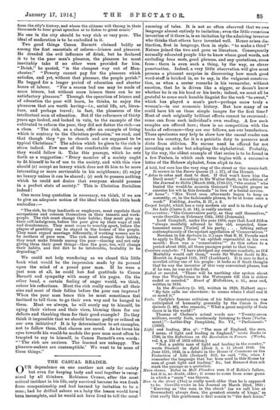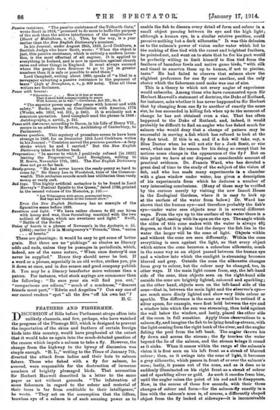THE CASUAL READER.
OUR dependenceon one another not only for society but even for keeping body and soul together is recog- nized by all thinkers. Robinson Crusoe, after the most critical incident in his life, only survived becauee he was fresh from companionship and had learned by imitation to be a man; Lad he drifted ashore as a baby the lesson would have been incomplete, and he would not have lived to tell the most amusing of tales. It is not so often observed that we owe language almost entirely to imitation; even the little conscious invention of it there is, is an imitation by the admiring inventor who thinks that others have invented well. Hence arises dis- tinction, first in language, then in style: "to make a third" Nature joined the two and gave us literature. Consequently normally educated people like to know where good words, not excluding bons mots, good phrases, and any quotations, come from : there is even such a thing, by the way, as ()lever punctuation. Indeed, a very little observation will give most persons a pleasant surprise in discovering how much good word-stuff is bricked in, so to say, in the vulgarest construc- tion, as when a costar remarks in his vernacular, without emotion, that he is driven like a nigger, or doesn't know whether he is on his head or his heels; indeed, we must all be grateful to some such humble linguist for the verb "to sweat," which has played a man's part—perhaps more truly a woman's—in our economic history. But how many of us could have bit on these simple images for the first time? Most of such originally brilliant efforts cannot be recovered: some can from each individual's own reading. .A. few such samples are offered here ; there is no competition with the books of reference—they are our fellows, not our benefactors. These specimens may help to show how the casual reader can serve his country, for it is a patriotic duty to preserve neat dicta from oblivion. No excuse need be offered for not inventing an order but adopting the alphabetical. Probably, by the way, the oldest example of that series is to be found in a few Psalms, in which each verse begins with a successive letter of the Hebrew alphabet, from aleph to tau.
A bold, bad man has the very ring of the street or the music-hall.
It occurs in the Faerie Queens I. 37), of the Hermit. "Ashes to ashes and dust to dust. If Clod won't have him the Devil must." According to Sir Walter Scott, in his edition of the Journal to Stella (March 25th,1710-11), "the sexton" who buried the would-be assassin Guiscard "thought proper to exercise his wit in this formula" in lieu of a burial service.
"At home": "Mrs. Trent soon afterwards began to keep an assembly, or, in the fashionable phrase, to be at home once a week." Fielding, Amelia, B. IL, a 8.
Ca:pet knight, which has a very modern air and is in the Lady of the Lake (Canto 5, st 14), is really ancient. Conservative: "the Conservative party, as they call themselves,' wrote Greville on February 24th, 1832 (Journals).
Lord Campbell, under the year 1834, says that Lord Eldon "always manfully adhered to this old, respected, time- honoured name [Tories] of his party, . . . talking rather contemptuously of the upstart appellation of 'Conservatives."
Newman in his Apologia (c. ii.) says that R. IL Fronde used to apply to Hugh Rose "an epithet reproachful in his own mouth: Rose was a !conservative:" As this refers to a period about 1833, all these passages point to that time. Creature onVorte a "I have abridged my creature comforts, as OM Mortality would call them," wrote Sir Walter Scott to Mr. Merritt on August 11th, 1817 (Lockhart). It is rare to find a novelist citing one of his people it looks as if Scott thought that he was the inventor of this very convenient phrase, but if he was, he was not the first.
Ended or mended. "There will be naething else spoken about frao the Weigh-house to the Watergate till this is either ended or mended." Heart of Midlothian, c. iii., near end, written in 1818.
In the Monastery (e. 10), written in 1820, Halbert says: "My fate calls me elsewhere: to scenes whom I shall end it or mend it."
Fools. Carlyle's famous criticism of his fellow.countrymen was anticipated of humanity generally by the Canon in Don Quixote (L 49), who remarks, " What a great majority of fouls them is in the world!"
Thomas of Chelsea's actual words are: "Twenty-seven millions, mostly fools, assiduously listening to them [Podia- ment]."—Latter-Day Pamphlets, No. VI., "Parliaments" (1850).
Light and Zeading, Men of: "The men of England, the men. I mean, of light and leading in England," wrote Darks is 1790, in the Reflections on the Revolution in France. (Works, voL 4, p. 233 of 1852 edition.) "Not a public man of light and leading in the country." wrote Disraeli in Sybil (Book 5, e. 1)a bout 1844. Oa
June liith, 1846, in a debate in the House of Commons on the Protection of Life (Ireland) Bill, he said, "Sir, when I remember the language that has been used in this Home by men of groat light and leading," fee., but Hansard does not mark the passage as a quotation.
Main chance. Defoe in Moll Flanders uses it of Robin's hither, but it is, no doubt, older; it seems to come from some game in which a "main" was thrown.
Man in the street (The) is really much older than he is supposed to be. Oreville wrote in his Journal on March 22nd, 1831: "Knowing as 'the man in the street' (as we call him at Newmarket) always does, the greatest secrete of kings," so that really this gentleman is first cousin to " the dark horse." Passive resistance. "The passive resistance of the Tolbooth Gate," wrote Scott in 1818, " promised to do more to baffle the purpose of the mob than the active interference of the magistrates (Heart of Midlothian, o. vi.). This, by the way, is a year earlier than the New English Dictionary's nominee. In his Journal, under August 28th, 1833, Lord Cockburn, a Scottish Judge who knew Scott, wrote: " When the object is just, this passive resistance, which is entirely a modern mven- lion, is the most effectual of all engines. It is applied to everything in Ireland, and is now in operation against church rates and other things in England. It must always succeed where the people have firmness to go to jail in greater numbers than it is safe or possible to send them." Lord Campbell, writing about 1860, speaks of "a libel in a newspaper exhorting a passive resistance to the payment of taxes" (Life sy. Brougham, o. v., p. 409 note). Thus all these writers are Scotsmen.
Peace with honour: rotashi•—. . . new is it less or worse
That it shall hold companionship in pea.
With honour, as in war.”—Corielones, Act 171/., Be. A
"The superior power may offer peace with honour and with safety." Burke, speech en Conciliation with America, 1776 (Works, edn. 1852, voL III., p. 246). It is evidently not • conscious quotation. Lord Campbell used the phrase in 1848 Autobiography, c. culls., p. 241.
Pam with dienonour, according to Bacon, in his Life of Henry VII., occurs in an address by Morton, Archbishop of Canterbury, to Parliament..
Precious guation. This mystery of procedure seems to have been strange in 1838, for on December 12th Lord Cockburn writes in his Journal " Comiston moved the previous question—a deep stroke which he and I carried." But the New English Dictionary takes it further back.
Progressives " In answer to which I positively refused in 1822] leaving the Progressives," Lord Brougham, writing to H. Reeve, November 17th, 1861. The New English Dictionary does not go so fez back. Ready-penny. "Ile had never known the ready-penny so hard to come by." Sir Henry Lee in Woodstock, time of the Common- wealth. This archaism sounds much less utilitarian than ready money or ready cash.
Red taps. This highly artificial metaphor is to be found in Lord Hervey's " Poetical Epistle to the Queen," dated 1738, printed in the second volume of his Memoirs, p. 166
" Let Wilmington with grave, .ntr.ted brow,
Red tape and wisdom at the Council show."
Even the New English Dictionary has no example of the figurative sense before 1838. Sweetness and light. "We have rather chosen to fill our hives with honey and wax, thus furnishing mankind with the two noblest of things, which are sweetness and light." Swift, "Battle of the Books."
Union of hearts is a phrase of Newman's in the Apologia, c. (1864); earlier it is in Montgomery's" Friends," thus, "union . . of hearts."
These are gleanings : it would be easy to get some of better grain. But there are no " pickings " so elusive as literary odds and ends, unless they be passages in periodicals, which, indeed, are of the same nature, "When once destroy'd can never be supplied" Hence they should never be lost. If a word or a phrase, especially in an old writer, strikes you, pin it down at once, and in due season and good company publish it. You may be a literary benefactor more welcome than a patron. For instance, what stock sayings are commoner than the following : "Be sure your sin will find you out," "comparisons are odious," "much of a muchness," "dearest friends must part," "Edwin and Angelina"? Can any one of our casual readers " spot" all the five "off his own bat"?
H. C.











































 Previous page
Previous page